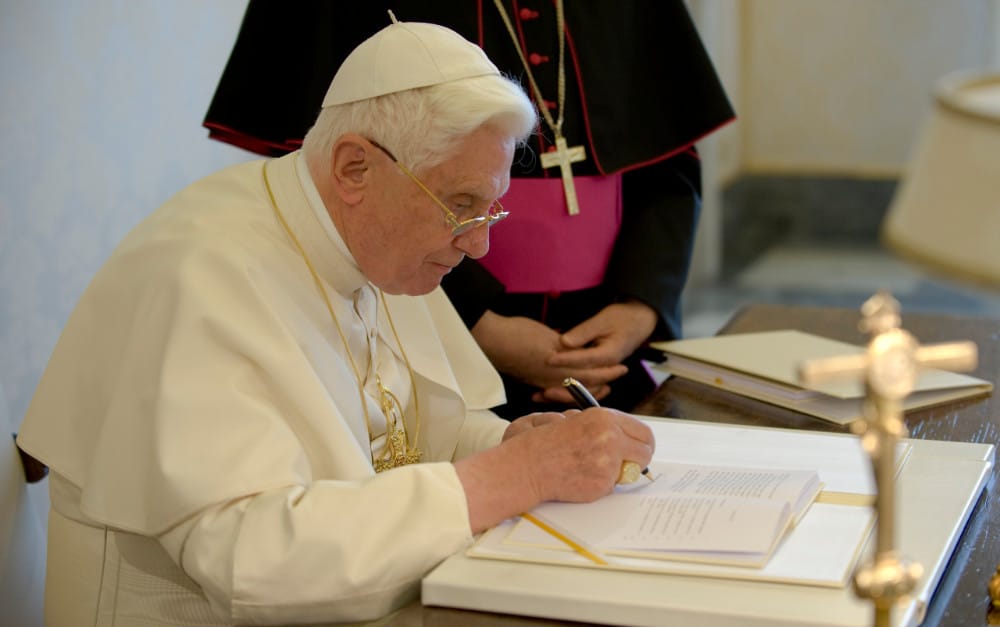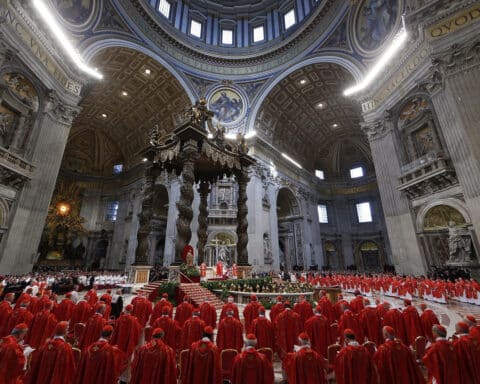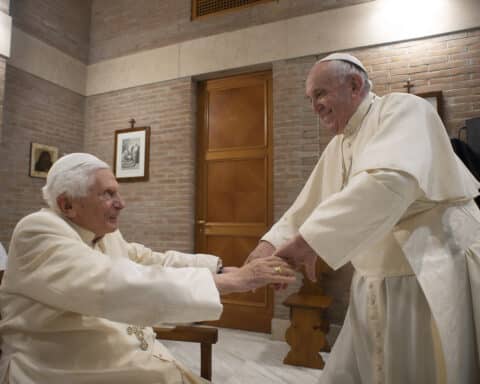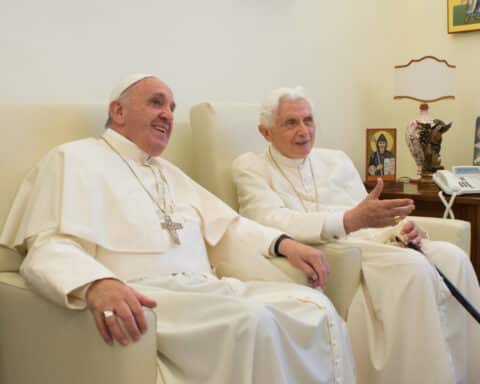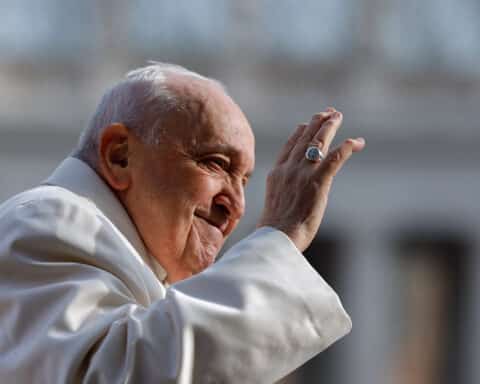Summing up the thought and influence of a particular pope upon his death will undoubtedly call for revision as the years pass and commentators bring new perspectives to bear upon the pope’s words, but considering Pope Emeritus Benedict XVI, one word that may endure is caritas.
Translated as “love” or “charity,” the word caritas permeates the works of Pope Benedict XVI. He writes about caritas as it is used in Scripture and Tradition, how it is manifested in the lives of individuals and communities, where one can find a model to emulate, and examples of misuse to avoid. But whenever he comments on caritas, Pope Benedict always returns to its perfection and fulfillment: the person of Jesus Christ.
Anyone reading the works of Pope Benedict XVI will be introduced to Jesus, who, for the pope, is not some historical figure to study but the living Lord. Pope Benedict encourages us to listen to the Gospels, through which Jesus continues to speak to us. Jesus may be encountered by us in the sacraments through the power of the Holy Spirit. We may enjoy a relationship with him in prayer.
As we honor his legacy and mourn his death, below is a sample of Pope Benedict XVI’s writings during his papacy. The sample includes all his apostolic exhortations (four) and encyclicals (three). They represent well the pope’s effort to share Jesus with all who would listen or read. He, of course, wrote many other books and articles throughout his long life, but perhaps a quote from the first volume of his Jesus of Nazareth series can serve as a fitting epitaph for a man who sought not only to lead others to Christ but also to follow the Master as well.
“The disciple who walks with Jesus is thus caught up with him into communion with God. And that is what redemption means: this stepping beyond the limits of human nature, which had been there as a possibility and an expectation in man, God’s image and likeness, since the moment of creation.”
Apostolic Constitution
Anglicanorum Coetibus (Providing for Personal Ordinariates for Anglicans Entering Full Communion with the Catholic Church)
Date: Nov. 4, 2009
Summary: Established the norms and structure for members of the Anglican faithful who requested as a corporate body to enter full communion with the Catholic Church. The ordinariate is “juridically comparable to a diocese,” with its own Ordinary who exercises his power jointly with the local diocesan bishop.
Apostolic Exhortations
Sacramentum Caritatis (Post-Synodal Apostolic Exhortation on the Eucharist as the Source and Summit of the Church’s Life and Mission)
Date: Feb. 22, 2007
Summary: Pope John Paul II called the 11th Ordinary General Assembly, but he died before it was convened. Pope Benedict XVI, therefore, brought the bishops together to reflect on the Eucharist and afterward published the apostolic exhortation. The text begins with the essence of the Catholic faith: “The sacrament of charity, the Holy Eucharist is the gift that Jesus Christ makes of himself, thus revealing to us God’s infinite love for every man and woman.” Sacramentum Caritatis looks at the Eucharist as a mystery to be believed, celebrated and lived. Catholics believe that at the celebration of the Eucharist the faithful receive “the body and blood of the Lord Jesus, a reality which surpasses all human understanding.” It is a gift from the Blessed Trinity, who through the Eucharist (and the other sacraments that are bound up with and directed toward the Eucharist) make us sharers in God’s own life. The Eucharist is meant to be celebrated by the Church, meaning all the faithful, clergy and laity together. The exhortation comments on the roles of the preside and assembly, emphasizing the active participation of the faithful. The third part connects the Eucharist and mission. We are to carry Christ to our homes and workplaces and communities, practicing the social doctrine of the Church, sanctifying the world and caring for creation.
Verbum Domini (Post-Synodal Apostolic Exhortation on the Word of God in the Life and Mission of the Church)
Date: Sept. 20, 2010
Summary: This exhortation follows the 12th Ordinary General Assembly of the Synod of Bishops (2008), and it is a very full and rich treatment of the word of God. The word refers, of course, to Scripture and Tradition, but Pope Benedict emphasizes strongly that the main subject is Jesus, whom John the Evangelist names in the prologue of his Gospel: “the Word, who from the beginning is with God, who became flesh and who made his dwelling among us” (1:14). There are three parts. The first part considers how the word of God has been received and understood throughout salvation history, without losing sight of the main message that Christianity is a religion “not of a written and mute word, but of the incarnate and living Word.” Like Mary, we should listen to and follow closely the word. In part two, Pope Benedict reflects on the word in the life of the Church, in the liturgy and in such practices as lectio divina. Part three proclaims the mission of the Church: To proclaim the word of God to the world.
Africae Munus (Post-Synodal Apostolic Exhortation on the Church in Africa in Service to Reconciliation, Justice and Peace)
Date: Nov. 19, 2011
Summary: Pope Benedict’s response to the Second Special Assembly for Africa of the Synod of Bishops (2009), focusing on the three themes named in the title. The document deliberately casts itself in the light of Pope St. John Paul II’s apostolic exhortation Ecclesia in Africa (1995). Essentially, Africae Munus is a pastoral plan to deepen the evangelization of the African continent and to renew the Catholic faith where it has waned. Pope Benedict recognizes the many blessings of the Church in Africa, such as the emphasis on the family and demonstrations of Christian maturity, while also acknowledging the various socio-political, ethnic, economic and ecological challenges. The exhortation outlines and revisits core Christian principles that it leaves to the particular Churches to translate into “resolutions and guidelines for action.”
Ecclesia in Medio Oriente (Post-Synodal Apostolic Exhortation on the Church in the Middle East: Communion and Witness)
Date: Sept. 14, 2012
Summary: Based on the propositions of the Synod for the Middle East at the Vatican in 2010, Pope Benedict addresses all the Churches in the Middle East that make up the Catholic Church there, including the Eastern Catholic Churches, to maintain communion with each other, even as they seek to dialogue with Jews and Muslims in the area. Given the instability of the area, the pope exhorts all to work for peace. Christians who are not in communion with the Catholic Church can nevertheless live an ecumenical life, promoting shared values, shared charitable services and mutual understanding. Interreligious dialogue should also be practiced, with due concern for religious freedom of all. The pope states that a “healthy secularity” and the creation of an environment where people do not have to leave in order to celebrate their faith are important values of any political system.
Encyclicals
Deus Caritas Est (“God Is Love”)
Date: Dec. 25, 2005
Summary: Pope Benedict XVI’s first encyclical focuses on love from two perspectives: God’s love lavished upon all people and the call to all men and women to share God’s love. Jesus is the incarnate love of God; he demonstrates how to both give and receive love. Jesus, fully receptive to the Father’s love, set a path that led to his cross and resurrection, “the path of the grain of wheat that falls to the ground and dies, and in this way bears much fruit.” His love is made ever-present in the Eucharist, at which the faithful receive the love of God. God’s love blossoms within men and women enabling them to love God and neighbor in return. The response of love, however, is a responsibility not only for the individual but also for the entire ecclesial community. The Church, by its practice of charity, provides what the State cannot: “loving personal concern.” It “acts as a subject with direct responsibility, doing what corresponds to her nature.” In one of the oft-quoted parts of the encyclical, Pope Benedict stresses that the Church must cooperate with the state: “She cannot and must not replace the state” but neither can she “remain on the sidelines in the fight for justice.”
Spe Salvi (“Saved by Hope”)
Date: Nov. 30, 2007
Summary: Spe salvi is a beautiful reflection on the theological virtue of hope. Pope Benedict states at the outset that the Christian message well received gives the listener hope, which is life-changing. “The one who has hope lives differently.” He offers the example of St. Josephine Bakhita, who was a slave in Sudan but ultimately was brought to Italy, where she heard the Gospel. When she learned that she was loved by God and awaited by him, she won her freedom and spent the rest of her life announcing liberation in Christ to all. To paraphrase Pope Benedict, St. Josephine’s hope became not only informative but also performative. We are all called to this hope we have in Christ, that we are saved by him and meant to live with him in love forever. Such hope leads us to live in the present for the future, no matter the obstacles. We can treat each other as true brothers and sisters, even when societal structures create inequalities, because of the love that draws us together in God. We are called to work in the world anticipating heaven. Prayer to God is an act of hope, because faith tells us God is listening. Loving others and building up society is always worthwhile since it anticipates the city of God. Even suffering and the judgment of God can be accepted in the light of hope. Although suffering for its own sake is not a good, our suffering can be united to Christ’s because of our hope in the resurrection and the final judgment, when God will set all things right according to perfect justice.
Caritas in Veritate (“Charity in Truth”)
Date: June 29, 2009
Summary: In this, his third encyclical, Pope Benedict references his first (Deus Caritas Est), reminding readers that God is love and, therefore, everything has its origin and end in love/God. Caritas in Veritate states that to keep love from slipping into sentimentality, love must be understood in connection with the truth of God, personified in Jesus Christ. Love or charity practiced in truth is the “driving force behind the authentic development of every human person and of all humanity.” It also drives Catholic social teaching, which offers the criteria that govern moral action, two of which Pope Benedict highlights in the encyclical: justice and the common good. Justice is the primary way of charity, giving a person what is his or hers or theirs (in terms of a people). But charity “completes” justice in “the logic of giving and forgiving,” helping individuals and communities to realize true integral human development (i.e., “the good of every man and of the whole man,” a concept drawn from Pope St. Paul VI’s encyclical Populorum Progressio). Charity in truth also seeks the common good, the good of individuals, families and intermediate groups that make up society. “Man’s earthly activity, when inspired and sustained by charity, contributes to the building of the universal city of God, which is the goal of the history of the human family.”
Motu Proprio
Summorum Pontificum (On the Roman liturgy prior to the reform of 1970)
Date: July 7, 2007
Summary: This motu proprio, or edict issued by Pope Benedict XVI on his own initiative, was in the news recently because its provisions for the celebration of the Traditional Latin Mass were overturned by Pope Francis’ Traditionis Custodes.
David Werning writes from Virginia.

